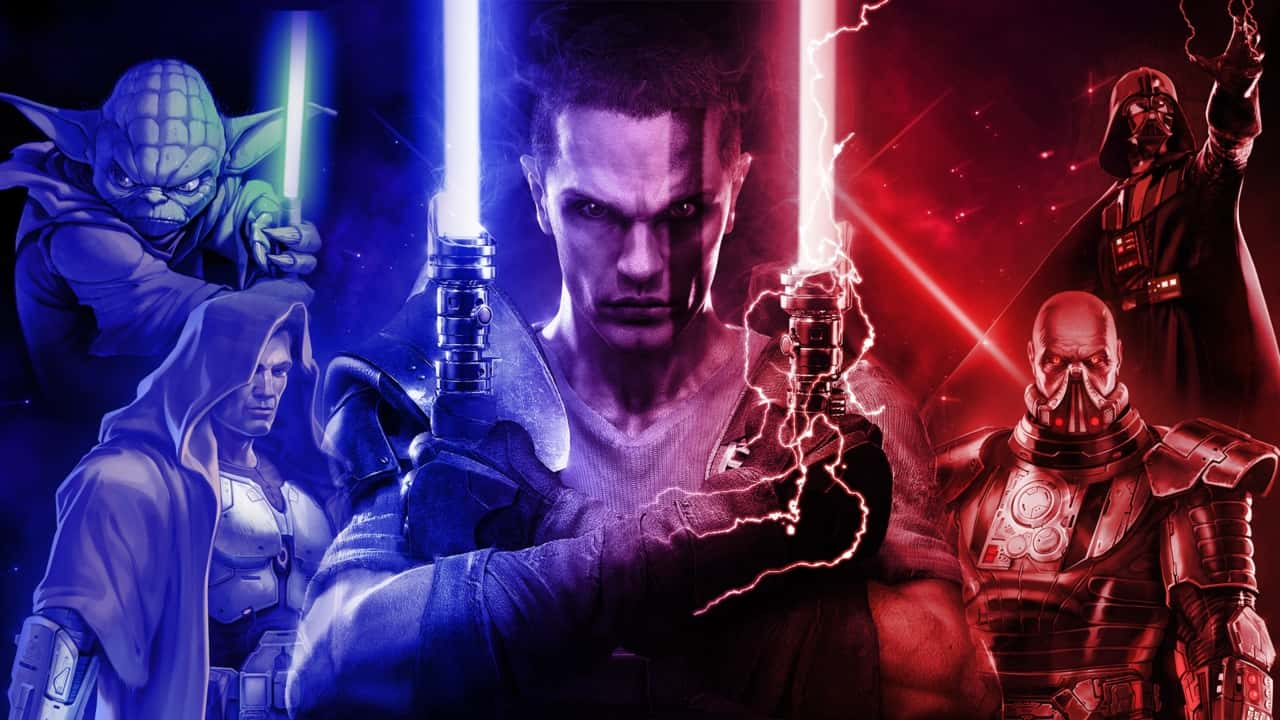When it comes to Jedis, George Lucas made one of two things: an error or something brilliant. We’ll see why in a moment.
Star wars has it all:
- alien worlds,
- space ships
- and the almighty good v evil theme.
In truth, though, George Lucas’ trilogies are coming of age stories, of boys becoming men.
Now, with the arrival of Ray in the Star Wars universe, we also have notable female characters. Though, based on episodes VII and VIII, she doesn’t have such a glamorous architectural story.
Speaking of the fathers and grandfathers of the Star Wars saga, Luke and Anakin go on their journeys as two boys with a taste for adventure, willing to scour the universe for said adventures.
They both need to leave their comfort with which they were used and start down their sinous paths that will see them transformed into men.
Even if their stories end in different ways, they are both molded by the Jedi order.
In the Star Wars saga, the Jedi order is quite of an old cult, made of monks with wisdom, telepathic and telekintic powers. Plus 6 feet of lightsaber per capita.
In the first six movies, the Jedi order is the opposite of Iceland when it comes to gender equality: patriarchy at its best.
You CAN see Jedi women here and there, but you never see them in command or able to make decisions for the order.
You could say that the Jedis are better than your prototypal men symbols.
- they don’t smoke,
- they don’t curse,
- they are as farsighted and calm as a buddhist monk can get
- they meditate
- and they don’t rely on brute force, the way I do at 12am in the morning with the fridge.
And besides them being a crossover between Bruce Lee and the Inquisition, it doesn’t mean that they are rolemodels.
George Lucas stole like an artist
From a bunch of places, when he made Star Wars.
And even if you could see the influence that the Asian culture has had on his work, Lucas prefers the Wild West when it comes to interviews.
Just like the marshals from the old Wild West, the Jedi don't throw the first punch. Even if they are perfectly capable of causing sobs and various brutalities when provoked.
Most of what we know about the Jedi, in the first 6 movies, is being told by Ben Kenobi and Yoda.
For example, we know that the essence of the Jedi dogma is the lack of feelings and emotions. Because in Star Wars, it’s not the dark side that’s the most hated enemy. It’s the feelings that a Jedi could possess.
And here’s where the wagon goes downhill, because the Jedi masters always push the envelope of suppressing your emotions and denying you feelings.
To get a better glimpse of this, let’s take Anakin’s story.
In the Phantom Menace, Qui Gon Jinn discovers that a certain boy from a planet he’s visiting is “force sensitive.” And decides to take him away from his mother, whom he loves quite dearly, on a planet that’s something like 4000 light years away.
Why does Qui Gon Jinn take the boy? So that the boy can become a Jedi knight.
Now, what happens when Anakin is introduced to the Jedi council? He’s rejected.
On the grounds that Yoda feels that the kid is emotional.
Why would the kid be emotional, can you guess? Because he’s worried sick about his mother. The mother which Qui Gon Jinn left into slavery on a god-forsaken planet, halfway across the universe.
The feelings that Anakin has, the emotions and the worry, all these are normal things. I don’t know who wouldn’t actually be concerned about their mothers, given the situation.
And it doesn’t stop here. Instead of someone telling him “it’s gonna be ok,” like it happens in almost all American movies, this kid is taunted and humiliated because he’s chewed by grief through and through of leaving his mother to rot on that planet.
Why does this happen? I’d say because nothing else matters for the Jedi, except total detachment.
The order and its council, like all sane non-sadists, have a firmly grounded opinion about padwans being instructed:
to deny any and all relatives or loved ones and forced to hide their feelings from everyone else.
They’re perfectly alright with Jedis displaying a calm and cold demeanour. And the padwans mustn’t bother any of the Jedi masters if they want to learn their tricks. They must learn to do it themselves.
Even if the Jedi order holds no perverse pleasure in torturing its padwans, emotionally abandoning a kid to his own devices could result in some pretty permanent psychological traumas.
Bell Hooks wrote a book called Will to Change and says things like
the way in which we turn boys into men is one of trauma by breaking all form of expressiveness towards the ones in their lives
This emotional disconnect becomes quite unhealthy in Episode 2, when Anakin is already a teenager and starts to become bratty and spoiled. Now a big boy, finding his way to adulthood, he’s trying to follow his Jedi training, while always remembering he had a mother that he’s left behind.
Anakin is between two worlds and his unease for his mother is summoning nightmares and premonitions. He doesn’t get any emotional ground, instead he’s expected to supress all emotional activity at once.
There are times when he can’t hide it fully. And in those times, Anakin is being perceived as a ticking bomb: an extremely volatile prime matter.
If you come to think of it, in the trilogy dedicated to the rise of Darth Vader, all those who express emotion are demonized, one way or another.
Not to mention the momentary recoil we have at those times when Anakin cries. Because in the Star Wars universe crying = weakness. And crying paints Anakin’s predisposition to becoming a Sith Lord.
Against popular belief, people who bury their feelings aren't tough. By extension, men who bury their feelings aren't tough guys. On the contrary.
A tough guy means someone who has the power to cry for help when needed, who has the strength to be vulnerable and awkward. Considering this, check out my SpiderMan analogy, why Homecoming is the perfect SpiderMan movie.
If one dives deep in the Star Wars lore, one will see that the earliest of Jedis tried to balance the light and dark side. They were allowed dark thoughts and emotions, so they were much more emotionally stable. However, the Jedis were so fearful of the dark side and emotions that lead to the dark side, that they banned any emotions.
Which is actually kind of backwards thinking, since this
- makes some Jedis ticking emotional time bombs
- and some of the most famous Jedis, like Luke Skywalker, have shown that balancing emotions can be more powerful than staying on one side of the force.
So the only feeling that the Jedi relegate to possess is that of remote compassion,
- focused on the greater good,
- detached from any actual individual’s suffering.
That’s why Qui Gon Jinn does nothing to save Anakin’s mother, even though it was in his power.
No wonder Anakin gets to hide his need for connection with another human being. And that connection will end up being a romantic relationship with Padme.
Beginning of the end
So Anakin ends up hiding his marriage with Padme and also hiding their unborn children.
In the last episode, when he’s having premonitions about his wife and children, he’s reaching out to Yoda, in search of advice. Without, actually, telling the master about his fears for his family’s safety. And that’s why Yoda gives him the worst possible piece of advice, ever.
If Yoda truly wanted to help Anakin, he could’ve counseled or sent him to someone who could. Yoda could’ve acknowledged the anxiety and pain through which Anakin was going and put him at ease.
Instead, Yoda is prevented from doing that by the Jedi order and by his own beliefs, given that he’s become a Jedi icon.
This leaves Anakin with advice like “bury your feelings and forget all the tragedy that has ever befallen you or your family.” And it doesn’t do any good, given that he’s afraid for his family.
Which leads to another core flaw of the Jedi order: fear is the number one enemy of a Jedi.
This is shown in all episodes, I to VI. Fear leads a Jedi Knight to the dark side.
In real life, though, fear does many things, not just lead you to take wrong decisions.
- Fear can keep you alive,
- it can teach you caution,
- it can make you care for people that mean something for you.
Instead, for the Jedi, this is of little use, given their philosophy:
fear ⇒ anger ⇒ hate ⇒ suffering;
anger + hate + suffering = dark side
Jedi philosophy
Given these concepts, you cannot but wonder if George Lucas made an error when he created the Jedis or he made something brilliant.
If he mistakingly assumed that this is how emotions work and wanted to make the Jedi some higher purpose, heavenly beings, then I believe he’s made an error, story-wise.
Fear is not at all something that leads to burning hatred and evil evil evil. It’s not some inevitable domino that will trigger the end of the world.
On the other hand, if George Lucas made the Jedi Order a psychologically flawed cult, a cult that traumatizes its own disciples, then it’s an artistic touch of craftsmanship that you can rarely find, given the Star Wars saga has one of the most debated lores in history.
The flaw in Jedi mentality
It is known that they restrict emotions of any kind, therefore even romantic ties. So that means that love is another reason for which a Jedi knight can succumb to the dark side, given the intricacies of romantic passion.
For the Jedi, anything close to a romantic partner means loss of control and going down the path of perdition. Nothing that was once noble about love is now standing:
- the will to move mountains,
- letting go of your ego and just being with your soulmate
- all the way to the selfless act of sacrificing oneself, so that the other may be safe from harm.
This all turns into an instability that the Jedi condemn and abolish or at least try to abolish, from its early stages. It’s especially fatal for a boy transitioning into a man, given the erected suspicious eyebrow, caused by such healthy emotions and intimacy.
You can also see this dysfunctional creed in Luke’s story, when old Ben Kenobi and old Yoda both ask the same thing of him: a Jedi master gets a hold of his emotions.
They both instruct Luke to abandon Leia and company, otherwise he’d be overcome with vulnerability and open to the same path as his father.
That’s how the emperor managed to turn Anakin into Darth Vader.
And that’s how the real world is treating boys and young men: show that you’re vulnerable and you’ll be prone to being manhandled. Or worse.
On the other hand, Luke sepparates himself from Anakin. While they both receive the same stoic training of the Jedi and not always obeying their commands, Luke isn’t influenced by the Jedi dogma, like Anakin is. Of course, that is also due to the fact that Luke is actually older, giving his emotional range an advantage over Anakin’s.
Luke has known grief and loss, when his aunt and uncle died.
For Anakin, though, his emotions come in direct conflict with his Jedi training and conditioning. This in turn generates anger, which turns into violence and horror, slaughtering everything in his path.
At practically every plot point in Revenge of the Sith, it feels like if someone sat down with Anakin and worked on an actual solution for his fears instead of vilifying him for having fears, none of this would have happened.
All Qui Gon Jinn had to do was
- pay whatever currency he was asked for,
- emancipate Anakin’s mother,
- give her a nice apartment in the capital
- and allow Anakin to visit her now and then.
Anakin’s mind would have been at ease, he would’ve been emotionally secure, and he could have focused on his training.
That would’ve been great.
But if that would've happened, we'd never have had Darth Vader.
Jedi teaching has it all wrong, and this seems to be hinted by various Siths throughout the saga: emotional remotenes fuels rage and a feeling of impotence, which leads Jedi into becoming Sith.
While Luke openly refuses the path that Yoda has set in front of him, of sacrificing friends and family for the greater good of his training, Anakin hides his wife and unborn children.
Come to think of it, Luke Skywalker is better than any Jedi we’ve seen on screen BECAUSE of his unwillingness to sacrifice his emotions. This is what ultimately makes him the best jedi: he wants to save his father and forgive him for his transgressions, even if the Jedi never did.
And of course, this is what props us to love the Skywalkers so much, that they’ve come full circle and made peace, allowing Anakin to finally find his family, albeit for a short, fleeting moment.
Coming back to suppressing emotion, that’s what any Jedi was supposed to do, if he’d followed the code: to mask their pain with passiveness and calm.
Here’s Alan Watts talking about the impossibility of this feat, in Out of Your Mind, Session 11: The World of Emptiness1:
[...] the Self is still playing the game of not being itself.
- fasting,
- doing all sorts of exercises,
- lying on beds of nails,
- sleeping on broken rocks,
- any kind of thing to break down egocentricity,
- to become unselfish, to become detached, to exterminate desire for life.
[...] all that was futile; that was not the Way.
And one day he broke his ascetic discipline and accepted a bowl of some kind of milk soup, from a girl who was looking after cattle.
And suddenly, in this tremendous relaxation, he went and sat down under a tree, and the burden lifted.
He saw, completely, that what he had been doing was on the wrong track.
No amount of effort will make a person who believes himself to be an ego be really unselfish.
Oh yes, you can imitate unselfishness.
You can go through all sorts of highly refined forms of selfishness, but you’re still tied to the wheel of becoming, by the golden chains of your good deeds, as the obviously bad people are tied to it by the iron chains of their misbehaviors.
Alan Watts
If you come to think of it, if the Jedi order didn’t have this strange idea of becoming a rock among rocks, devoid of any feeling and emotion, Darth Vader wouldn’t have happened. And of course Star Wars wouldn’t have happened.
Which is why I believe that George Lucas is a great storyteller, whereas the present trilogy is a mishmash of something that could’ve been great.
It’s interesting to see how Kylo Ren is very expressive of his emotions, in this new trilogy. And what keeps dragging him to the Light are his feelings and his connections to his parents. What turned him into Kylo Ren, in the first place, was Luke’s moment of pure rationality.
And it was also Luke’s moment of rationality that prevented him from killing Kylo. Luke even says that he regrets attempting to kill Kylo and wishes he had legitimately nurtured the kid, rather than simply letting him deal with it himself.
Ultimately, it is the tragedy of the prequels that put the Star Wars saga in motion: the Jedi get their Messiah and fail him.
The Jedi do more to turn Anakin into Vader, than Palpatine ever did.
That’s why, in my opinion, Chewy is the best role model in Star Wars :)
If you liked this article and think others should read it, please share it on Twitter



